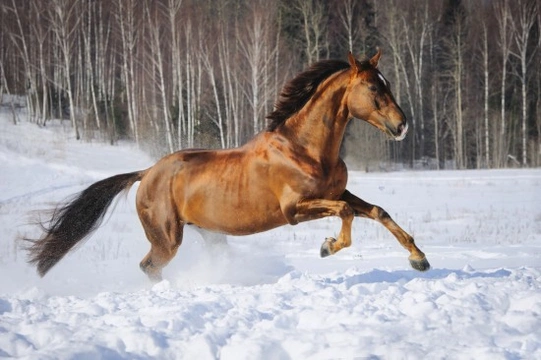
Tips on Taking Care of Horses in Colder Weather
With Christmas over and the weather set to turn even colder in the coming weeks, it's time to assess just how well any horses that have been turned away for the winter are coping. By now most horses living outdoors will have adapted to their environment and most will have been rugged up to help keep them warm except of course, many of the native breeds that is. With this said, it's important to check on them at least twice a day, but if the weather turns really nasty ideally you should check on your horses several times a day.
Rugging Your Horse During the Winter
Once horses have been rugged up when they've been turned away for the winter, it's essential for them to remain rugged until the warmer weather arrives. This means daily checks to make sure rugs are still in place, have not been discarded, damaged or torn. Horses are amazingly good at getting their rugs off which can often leave their owners more than a bit bewildered at just how they did it.
Lots of horses also get their legs tangled up in their belly or leg straps which then usually leads to rugs getting ripped to shreds. The result is a damaged rug that provides less protection and the chances are it's not as waterproof as it once was either.
Rugs often get caked in mud which makes them rigid and uncomfortable for the horse to have on their backs. This can lead to sores developing on their chests, back of their legs and on the withers. The result is a very unhappy horse and one that needs their rug changing sooner rather than later whilst the muddy one gets hosed off ready to be used again.
Making Sure Rugs are Still Waterproof
It's also important to make sure rugs are still waterproof because it they are not, they are not providing the sort of protection your horse needs. The result is a cold horse even when they are rugged which could lead to all sorts of health issues.
Is There Any Shelter in the Paddock?
If the weather turns really cold, wet and windy, it's important for horses to be able to tuck themselves away in a more sheltered spot in their paddock. This could be a nice hedge, some bushes or ideally a field shelter. Although horses can cope with bad weather conditions, they do like to be able to get out of the worst of it so it's important to provide them with this option even when they are rugged up.
Daily Checks are a Must
It's also essential to check on horses a few times every day not only to see if their rugs are still in place, but to see if they are shivering which is a sure sign of them feeling the cold a little too much. However, it's also a good idea to see if they are sweating under their rugs which could mean they would need to have a lighter rug on during the day and then a heavier one at night when the temperature drops.
Taking Rugs Off Allows You to Check Condition
The only way to see if your horse is dropping weight when they have been turned away for the winter, is to routinely take off their rugs and to assess their condition. Seeing a horse rugged up can be misleading because everything looks okay. It's not until you take off their rug that you may notice a drop in weight and condition which means they might not be doing as well as they should and this would need to be addressed sooner rather than later.
If you find your horse has lost weight and condition you may need to up their food intake always ensuring they have constant access to good quality hay that's placed in a more sheltered part of the field for them to munch on.
Checking Water Troughs is Essential
Apart from making sure your horse has shelter and enough food, you also need to check water troughs or containers every single day and if the weather is freezing, this needs to be done several times a day. You have to bear in mind that if a horse gets dehydrated which can happen even when the weather is cold, the risk of them developing colic is greatly increased.
If water troughs or containers are constantly getting frozen over, it's a good idea to place a large plastic ball in them which helps prevent this from happening. However, you have to use a ball that horses would not be able to get in their mouths which they could end up swallowing!
Conclusion
Keeping horses safe over the colder winter months can be a little challenging. However, as with everything the more preparation that's set in place, the easier the task tends to be. Providing adequate shelter, food and fresh clean water is essential for horses when they are turned away for the winter. It's also important to check their weight and condition on a regular basis to make sure they are doing well. If the weather turns extremely nasty and you do have the option to bring your horse in out of the really bad weather, it's best to do so because it gives you peace of mind they are safe, happy and warm.



